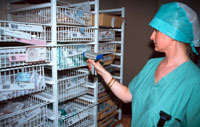Five trusts adopt ‘scan and save’ for surgical instruments
- 5 June 2007
 Radio Frequency Identification and barcode standards specialist GS1 UK says that five NHS trusts in the North-west have signed up for to its ‘scan and save’ initiative for automatically tracking and tracing sterile surgical instruments.
Radio Frequency Identification and barcode standards specialist GS1 UK says that five NHS trusts in the North-west have signed up for to its ‘scan and save’ initiative for automatically tracking and tracing sterile surgical instruments.
This will allow the hospital to trace the complete life cycle of surgical instruments, including the verification of the decontamination and sterilisation process, and determine in which operation the instruments were used.
The five North-west trusts to become the first to adopt the GS1 technology are the Christie Hospital NHS Foundation Trust, the Derby Hospitals NHS Foundation Trust, North Cheshire Hospitals NHS Trust, Trafford Healthcare NHS Trust and the University Hospital of South Manchester NHS Foundation Trust.
GS1 has been working with the Department of Health on the initiative since last February, when it published the report ‘Coding for Success: simple technology for safer patient care’ advocating the use of smart wireless wristbands and barcode labelling technologies.
GS1’s healthcare manager, Roger Lamb, told E-Health Insider: “Sterile surgical instrument tracking programme is the first pilot project driving take up of GS1 membership. As we work more closely with the NHS and momentum for the ‘scan and save’ initiative builds we expect to see a growth in such pilots covering pharmacy manufacturing, patient identification and surgical instrument tracking.”
Developed in association with the NHS Purchasing and Supply Agency, the barcode system will enable automatic identification by barcoding all sterile surgical instruments in the hospital. Using the system, instruments are scanned before and after use in theatre to track them.
GS1’s chief executive, Gary Lynch, said: “Saving lives and money are two benefits which the NHS quite literally cannot afford to ignore. It is encouraging to see this level of interest so early on in the initiative, and we look forward to providing support to the hospitals involved to ensure they reap the full rewards. We urge hospitals across the UK to sign up to the ‘scan and save’ initiative and improve patient safety.”
The North West Sterile Service Collaboration’s customer contract manager, Caroline Robinson, said: “Having properly decontaminated and sterile surgical instruments for an operation is an obvious requirement, but the bar code tracking is essential to allow traceability from one patient to another in the unlikely event of a recall procedure. It also allows historical information to be built up on individual instrumentation.
“Rescheduling operations due to missing or unsatisfactory surgical instruments not only presents a potential threat to the patient due to be treated, but it has a much wider impact both on the smooth running of a hospital department and the budget.”
GS1 now want to get more trusts to invest in the system and introduce automatic identification and data capture (AIDC) technologies, such as barcodes, used across their hospitals.
They will be running a conference on 5 July at the City of Manchester Stadium which will include a specialised workshop on surgical instrument traceability. Speakers will be present from Connecting for Health (CfH), the National Decontamination Programme and the Chelsea and Westminster Hospital NHS Foundation Trust.
Lamb added: “We are also currently contacting every NHS trust in England to explain that CfH has provided membership of GS1 for all hospitals who want to take advantage of bar coding to improve patient safety.”
The Department of Health believes that AIDC technology has the potential to tackle mismatching errors in particular, as well as bringing other efficiencies and cost savings – at present errors, many of which are caused by getting the patient identity wrong, are estimated to cost the NHS as much as £2 billion in extra bed days. Auto-identification could make a significant impact on this cost.
Health minister, Lord Hunt said: “Auto-identification is not a new technology – we’ve all been used to bar codes in supermarkets for years. But to reap the benefits in healthcare everyone needs to work to agreed standards. We are recommending that both industry and the NHS should use the GS1 System for coding, and I am delighted to be able to announce that GS1UK will be providing membership and support to NHS organisations who want to move forward on this.”
The Department of Health are recommending that the GS1 system should be adopted throughout the healthcare system in England, both for manufactured products and for coding systems used within healthcare settings, such as patient identification codes on wristbands. They will review progress by the end of 2008.
Links
DH embraces wireless safety technologies (E-Health Insider, 16.02.07)




